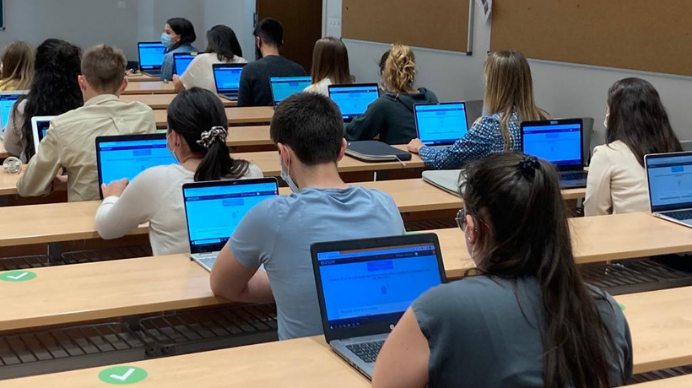
Since June 2020, more than a dozen European and Latin American universities have worked on cases from the Practicum Script clinical simulation program as a final clinical reasoning assessment exam for senior medical students. This resource, often integrated with several stations of the Objective Structured Clinical Exam (OSCE), arrived triggered by the pandemic and was currently revalidated. As a partial OSCE, which can be carried out in person or remotely and has proven validity in the field of psychometrics, Practicum Script is linked to decisions regarding promotion and graduation.
Madrid - September 15, 2021. Although the core of Practicum Script is formative and longitudinal evaluation, a mixed implementation modality begins to prevail in the university community, going through the first cycle of training and familiarization with the methodology, followed by an exam with 7 to 10 clinical cases from the program to measure competence in clinical reasoning. The objective of summative evaluation is to determine the degree of achievement that final-year students (6th year, in much of Europe) have obtained concerning the objectives set for the final stage of medical training. Now it is time to measure the learning outcomes.
The OSCE is a practical exam that evaluates clinical competencies like anamnesis, physical exam, clinical management, prevention, and communication and technical skills. The exam uses standardized patients to assess the students' knowledge in a real clinical environment, i.e., in a consultation, emergency or hospitalization room. Each of these candidate-patient encounters is called a "station", and the test is usually made up of 12 to 20 stations. Practicum takes up a quarter of this proposal as an instrument of high acceptability, objectivity and educational impact. The head of psychometry at Practicum is affiliated with the University of Maastricht.
Through simulated clinical cases based on real-life patient records, Practicum Script reproduces medical situations analogous to real ones, with a powerful display of multimedia content to present clinical vignettes and complementary tests. This model removes from the equation the need for actors simulating ailments and observers physically supervising the clinical encounter. With Practicum Script, the (future) doctor-patient interrelation takes place in the digital space and is supported by an artificial intelligence system that introduces uncertainty by going beyond the limitations of multiple-choice questions.
The integration of Practicum Script into the traditional OSCE strategy has been highly valued by medical schools, fundamentally because of the relevance of the evaluation of reasoning for certification of future doctors and the possibility of implementing this evaluation through a standardized methodology with proven psychometric reliability and validity.
Experiences in the classroom and remotely
During lockdown, most teachers who resorted to Practicum Script agreed that it contributed to the students concluding their clinical training with the integration of knowledge and skills for medical practice while allowing them to evaluate their autonomy to make decisions. This is the case of Montse Virumbrales (head of the simulation area at the International University of Catalonia), Emilio Cervera (vice-dean of practices at the Francisco de Vitoria University in Madrid) and Marta López del Hierro (coordinator of the third-year to sixth-year program at the European University of Madrid).
According to the satisfaction surveys, this OSCE is homogeneous, valid in terms of measuring results and, above all, feasible to be carried out in the classroom or remotely. As an example, Prof. Virumbrales along with Prof. Antonio López Román (director of the virtual hospital at the Alfonso X El Sabio University in Madrid), chose to introduce PS-OSCE tests in their study centres in June 2021, obtaining excellent results. Prof. López is convinced of the importance of digital transformation within the "new normal" and believes that technology has not arrived to replace anything or anyone but to complement the teaching/learning system.
Paata Tsagareishvili, vice-dean of medical education at David Tvildiani Medical University in Georgia, also considers technology to be a way to optimize pedagogy for the digital generation. Adriana V. Ingratta, the coordinator of the simulation area at the Universidad del Salvador in Argentina, contemplates the near future when she is convinced that the main advantage of Practicum Script lies in its potential to teach "to learn how to do". Along these lines, Lenin de Janon Quevedo (director of the medical career at the Catholic University of Argentina) and Blanca Chong (head of continuing medical education at the La Salle University of Mexico) will seek to ensure that their students meet the demands of real practice through the PS-OSCE test in 2021/2022.
Our personalized help center enables you to obtain technical support and help for navigating through the site and using the program.